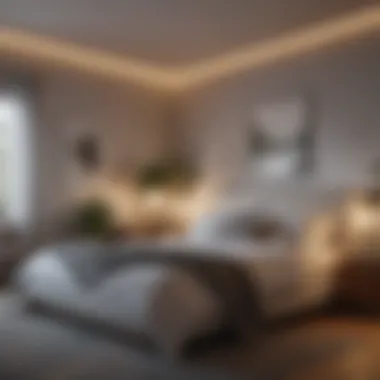Expert Strategies for Calming Anxiety at Night and Ensuring a Peaceful Sleep


Understanding Resilience, Well-Being, and Adaptability
Anxiety, especially at night, can be a challenging hurdle for many individuals striving for a peaceful and restful sleep. Understanding resilience, well-being, and adaptability becomes paramount in tackling this issue. Resilience refers to one's ability to bounce back from adversity, while well-being encompasses mental and emotional health. Additionally, adaptability involves the capacity to adjust to new circumstances, crucial in managing anxiety effectively. Recognizing and nurturing these qualities lay the foundation for combating nighttime anxiety.
Importance of Cultivating Resilience and Well-Being
Cultivating resilience and well-being is not solely beneficial for personal growth but also plays a pivotal role in organizational development. Individuals with high levels of resilience are better equipped to navigate stress and anxiety, reducing the impact on their sleep quality. Simultaneously, prioritizing well-being fosters mental clarity and emotional stability, essential for combating nighttime anxiety effectively. The symbiotic relationship between personal and organizational well-being emphasizes the significance of fostering these attributes.
Strategies for Enhancing Resilience and Well-Being
In the quest to calm anxiety at night, exploring strategies for enhancing resilience and well-being is essential. Engaging in mindfulness practices, such as meditation and deep breathing exercises, can bolster resilience by promoting emotional regulation and stress management. Additionally, maintaining a balanced lifestyle through adequate sleep, nutrition, and exercise contributes significantly to overall well-being, fostering a sense of calmness that transcends into nighttime relaxation. Implementing these strategies empowers individuals to proactively manage anxiety and cultivate a peaceful nighttime routine.
Understanding Nighttime Anxiety
Understanding Nighttime Anxiety holds significant importance in this discourse centered on calming anxiety at night. This section aims to delve into the intricacies of nighttime anxiety, emphasizing its impact on sleep and overall well-being. By comprehending the root causes and manifestations of nighttime anxiety, individuals can effectively address and mitigate its effects, paving the way for a restful night's sleep.
Causes of Nighttime Anxiety
Stress and Overthinking
Stress and overthinking constitute prevalent triggers for nighttime anxiety. The perpetual cycle of intrusive thoughts and heightened stress levels can lead to persistent nighttime restlessness. Understanding the interplay between stress, overthinking, and anxiety is crucial in devising coping mechanisms and relaxation strategies to alleviate nighttime distress. Exploring the deleterious effects of chronic stress and overthinking on mental health illuminates the necessity of addressing these factors to promote calm and peace during bedtime routines.
Fear of the Unknown
The fear of the unknown serves as a powerful instigator of nighttime anxiety, plaguing individuals with apprehensions about uncertain outcomes and future events. Unraveling the fear's grip on one's psyche entails unraveling its underlying causes and triggers. Acknowledging the pervasive nature of fear of the unknown in contributing to nocturnal anxiety underscores the importance of cultivating resilience and emotional stability to counteract its disruptive influence.
Past Traumatic Experiences
Past traumatic experiences can cast a long shadow on nighttime tranquility, resurfacing in the form of intrusive thoughts and flashbacks during vulnerable nighttime hours. Delving into the impact of past traumas on current mental well-being is essential for understanding and mitigating their effects on sleep patterns. By recognizing the reverberations of past traumatic experiences on nighttime anxiety, individuals can embark on a journey towards healing and emotional restoration.
Impact on Sleep
Disrupted Sleep Patterns


Disrupted sleep patterns, a hallmark of nighttime anxiety, disrupt the natural sleep-wake cycle, leading to fragmented and unrestful sleep. Scrutinizing the disruptive effects of irregular sleep patterns sheds light on the importance of establishing a consistent sleep routine and conducive sleep environment. Redirecting focus towards restoring balanced sleep patterns is imperative in combating the detrimental effects of nighttime anxiety on overall sleep quality.
Reduced Sleep Quality
Reduced sleep quality, a consequence of nighttime anxiety, compromises the restorative functions of sleep, leaving individuals feeling fatigued and groggy upon waking. Examining the repercussions of diminished sleep quality underscores the significance of addressing underlying anxiety issues to restore optimal sleep patterns. Enhancing sleep quality through targeted interventions and relaxation techniques is pivotal in enhancing overall well-being and cognitive function.
Morning Fatigue and Irritability
Morning fatigue and irritability, byproducts of disrupted sleep due to nighttime anxiety, detract from one's holistic wellness and productivity throughout the day. Probing into the causes of morning fatigue and irritability offers insights into the cascading effects of nighttime anxiety on daytime functioning. Mitigating morning fatigue and irritability involves implementing strategies to promote restorative sleep and emotional equilibrium, thereby fostering a sense of vitality and mental clarity.
Creating a Calming Environment
When addressing nighttime anxiety, it is crucial to focus on creating a calming environment to promote relaxation and restful sleep. The ambiance and setup of your bedroom play a significant role in alleviating anxiety and fostering a sense of tranquility. By optimizing your surroundings, you can significantly impact your mental and emotional state before bedtime, ultimately improving your overall sleep quality and well-being.
Optimizing Your Bedroom
Dimming Lights
Dimming lights play a pivotal role in signaling to your brain that it is time to wind down and prepare for sleep. By lowering the intensity of the lighting in your bedroom, you can create a soothing atmosphere that promotes relaxation. Dim lighting reduces visual stimulation, helping to calm the mind and reduce feelings of anxiety. It is a popular choice for individuals seeking to create a cozy and peaceful environment conducive to unwinding before bedtime.
Comfortable Bedding
Investing in comfortable bedding is essential for ensuring a good night's sleep. Soft, high-quality sheets, and supportive pillows can enhance comfort and physical relaxation. Comfortable bedding promotes better sleep posture, reducing physical tension and discomfort that can exacerbate anxiety. The cozy and inviting nature of comfortable bedding can psychologically signal to your brain that it is time to relax and prepare for rest.
Decluttering Space
A clutter-free bedroom can have a significant impact on mental well-being and sleep quality. Decluttering your space by organizing personal items and maintaining a tidy environment can create a sense of calm and order. A clean and organized space promotes relaxation, reduces visual distractions, and fosters a peaceful mindset. Decluttering is advantageous in reducing feelings of overwhelm and anxiety that may arise from a chaotic living environment.
Temperature and Noise Control
Ideal Sleep Temperature
Maintaining an ideal sleep temperature in your bedroom is essential for optimizing sleep quality. A cool, comfortable room temperature of around 60-67°F (15-19°C) is ideal for promoting sleep. The temperature regulates your body's internal clock and can influence the quality of your rest. A conducive sleep environment sets the stage for relaxation and can help alleviate nighttime anxiety by ensuring physical comfort.
White Noise Machines


White noise machines are effective tools for masking disruptive sounds that may interfere with your sleep. The consistent sound produced by these machines can drown out background noise, creating a soothing auditory environment. White noise promotes relaxation by reducing environmental disturbances and can be particularly beneficial for individuals sensitive to external sounds. Integrating a white noise machine into your bedtime routine can enhance your sleep environment and support anxiety reduction.
Earpluities and personal preferences. Earplugs are convenient for blocking out noise disturbances, enabling you to create a quiet and tranquil sleep environment. Disadvantages may include discomfort for some individuals or difficulty sleeping with earplugs inserted. When used properly, earplugs or headphones can effectively contribute to noise control and help in reducing nighttime anxiety by promoting a quieter and more peaceful sleeping space.
Establishing a Relaxing Bedtime Routine
In the broad scope of strategies to alleviate nighttime anxiety, establishing a relaxing bedtime routine plays a pivotal role. This segment delves into the significance of winding down during the evening hours, setting the stage for a peaceful night's rest. A calming bedtime routine involves a series of deliberate actions aimed at quieting the mind and preparing the body for sleep. By emphasizing consistency and soothing activities, individuals can create a conducive environment that promotes relaxation and minimizes anxious thoughts. Developing a bedtime routine helps signal the brain that it's time to unwind and facilitates the transition from wakefulness to a state of calmness, essential for combating nighttime anxiety. Incorporating activities that promote relaxation before sleep is crucial for enhancing sleep quality and overall well-being.
Avoiding Stimulants Before Bed
Caffeine
Delving into the specifics of caffeine and its role in managing nighttime anxiety, we encounter a widely consumed stimulant that can significantly impact sleep patterns. Caffeine, a central nervous system stimulant, is known for its alertness-inducing properties, making it a popular choice for combating drowsiness. However, its presence in the evening hours can disrupt the body's natural circadian rhythm, hindering the ability to relax and fall asleep. By understanding the effects of caffeine on the body, individuals can make informed decisions about limiting or avoiding its consumption close to bedtime, thereby promoting better sleep quality and reducing nighttime anxiety.
Electronic Devices
Electronic devices have become ubiquitous in modern society, playing a prominent role in daily activities. However, their excessive use before bedtime can have detrimental effects on sleep hygiene and exacerbate nighttime anxiety. The blue light emitted by screens can interfere with the production of melatonin, a hormone essential for regulating the sleep-wake cycle. Constant exposure to electronic devices can lead to heightened alertness and cognitive arousal, making it challenging to unwind and prepare for sleep. By minimizing screen time before bed and implementing screen-free activities, individuals can create a more calming environment conducive to restful sleep and anxiety reduction.
Intense Physical Activity
Intense physical activity, while beneficial for overall health and well-being, can have varying effects on nighttime anxiety depending on the timing and intensity of the exercise. Engaging in vigorous physical activity close to bedtime can elevate heart rate and body temperature, potentially making it difficult to relax and initiate sleep. However, incorporating moderate physical activity earlier in the day can promote the release of endorphins and reduce overall stress levels, contributing to a calmer state of mind conducive to better sleep. By understanding the implications of intense physical activity on nighttime anxiety, individuals can tailor their exercise routine to optimize sleep quality and promote relaxation.
Utilizing Relaxation Techniques
In the realm of anxiety management, Utilizing Relaxation Techniques holds paramount significance. These practices offer individuals a proactive approach to mitigating anxious symptoms and promoting a state of calm. By incorporating relaxation techniques into one's routine, individuals can cultivate a sense of emotional balance and inner peace. Moreover, these techniques play a pivotal role in combating nighttime anxiety, aiding individuals in achieving a restful night's sleep. Whether it's through Progressive Muscle Relaxation or Guided Imagery and Visualization, the practice of relaxation techniques enhances mental clarity, reduces physical tension, and fosters a deeper connection between the mind and body.
Progressive Muscle Relaxation
Step-by-Step Muscle Tension Release
Step-by-Step Muscle Tension Release is a core component of Progressive Muscle Relaxation, focusing on the gradual relaxation of individual muscle groups. This technique involves tensing specific muscles for a few seconds before releasing the tension, leading to a heightened sense of relaxation and relief. By systematically targeting each muscle group, individuals can alleviate physical tension, reduce stress levels, and promote a profound sense of relaxation throughout the body. Step-by-Step Muscle Tension Release is a highly effective method for releasing pent-up stress and promoting overall well-being during times of heightened anxiety.
Focused Awareness on Relaxing Muscles


Focused Awareness on Relaxing Muscles centers on directing attention towards actively relaxing and releasing tension from various muscle groups. By honing in on specific areas of the body, individuals can cultivate a heightened sense of body awareness and mindfulness, promoting relaxation and stress relief. This practice not only helps in alleviating physical tension but also encourages individuals to be present in the moment, fostering a deeper sense of tranquility and peace of mind. Focused Awareness on Relaxing Muscles serves as a valuable tool in combating anxiety, allowing individuals to unwind and recalibrate both mentally and physically.
Enhanced Mind-Body Connection
Enhanced Mind-Body Connection emphasizes the integration of mental and physical well-being through relaxation techniques. By fostering a stronger connection between the mind and body, individuals can enhance their overall emotional resilience and self-awareness. This practice enables individuals to recognize the impact of thoughts and emotions on bodily sensations, guiding them towards a more harmonious and balanced state. Enhanced Mind-Body Connection not only aids in reducing anxiety symptoms but also promotes a holistic approach to well-being, empowering individuals to cultivate a profound sense of inner peace and emotional stability.
Guided Imagery and Visualization
Creating Mental Escapes
Creating Mental Escapes involves the utilization of vivid imagery to transport individuals to peaceful and calming mental landscapes. By immersing oneself in positive and serene mental scenarios, individuals can detach from anxiety-provoking thoughts and cultivate a sense of tranquility. This practice serves as a powerful distraction from negative emotions, allowing individuals to refocus their minds on soothing visualizations. Creating Mental Escapes offers a creative and immersive way to combat anxiety, providing individuals with a mental sanctuary to retreat to during times of distress.
Positive Visualization
Positive Visualization centers on the practice of envisioning positive outcomes and experiences to counteract anxious thoughts. By visualizing success, happiness, and inner peace, individuals can reframe negative thought patterns and elevate their mood. This technique enables individuals to tap into the power of positive thinking, promoting optimism and emotional well-being. Positive Visualization serves as a valuable tool in reducing anxiety symptoms and fostering a mindset of resilience and positivity in the face of adversity.
Reducing Anxiety Symptoms
Reducing Anxiety Symptoms aims to alleviate the physical and emotional manifestations of anxiety through visualization techniques. By focusing on calming images and scenarios, individuals can lower their stress levels and induce a sense of relaxation. This practice not only helps in managing immediate anxiety episodes but also equips individuals with long-term coping strategies for handling stress and worry. Reducing Anxiety Symptoms empowers individuals to take control of their mental and emotional well-being, providing a holistic approach to managing anxiety and promoting inner peace.
Seeking Professional Help
In the realm of strategies for managing nighttime anxiety, seeking professional help holds significant weight. Amid the array of effective techniques discussed in this article, professional guidance stands out as a crucial pillar of support. Addressing anxiety at night may necessitate expert intervention to navigate the complexities and underlying factors. Consulting with trained professionals, such as therapists or counselors, offers a structured approach towards understanding and managing nighttime anxiety. Additionally, seeking professional help can provide tailored interventions and personalized strategies to address individual needs and concerns. Embracing this aspect reflects a proactive step towards prioritizing mental well-being and seeking sustainable solutions for nighttime anxiety.
Therapy and Counseling
Cognitive-Behavioral Therapy
Cognitive-Behavioral Therapy (CBT) emerges as a cornerstone in combating nighttime anxiety within the context of seeking professional help. This psychotherapeutic approach focuses on identifying and reshaping negative thought patterns and behaviors that contribute to anxiety. Through the collaborative efforts of the therapist and individual, CBT equips individuals with practical tools to challenge and reframe anxious thoughts, promoting healthier coping mechanisms. Its structured nature and evidence-based success rates position CBT as a favored choice for addressing nighttime anxiety. However, one must consider the time commitment and cognitive effort required for effective implementation of CBT in managing anxiety at night.
Psychotherapy Sessions
Engaging in psychotherapy sessions offers a supportive space for individuals to explore and dissect their nighttime anxiety triggers and experiences under the guidance of a trained mental health professional. By delving into deeper emotional layers and subconscious patterns, psychotherapy aims to unearth root causes of anxiety and instigate healing and personal growth. The personalized nature of psychotherapy sessions allows for a nuanced and holistic approach towards managing nighttime anxiety, fostering self-awareness and emotional resilience. It's important to note that the effectiveness of psychotherapy may vary based on individual preferences and the therapeutic relationship established with the counselor.
Support Groups
Participation in support groups constitutes a valuable facet of seeking professional help to alleviate nighttime anxiety. These group settings offer a sense of belonging and camaraderie, uniting individuals experiencing similar challenges in managing anxiety at night. Sharing experiences, coping strategies, and encouragement within a supportive community can enhance emotional well-being and reduce feelings of isolation. Support groups create a platform for individuals to validate their struggles, gain perspective, and discover coping mechanisms, fostering a sense of empowerment and solidarity in navigating nighttime anxiety effectively.
Consulting a Healthcare Provider
When combating nighttime anxiety, consulting a healthcare provider plays a pivotal role in optimizing treatment strategies and addressing underlying health concerns. Healthcare professionals, including physicians and psychiatrists, bring a medical perspective to understand the physical and psychological dimensions of anxiety. By collaborating with a healthcare provider, individuals can explore various treatment avenues and obtain expert guidance tailored to their specific needs. Seeking professional medical advice offers a comprehensive approach towards managing nighttime anxiety, considering potential medication options, evaluation of underlying conditions, and formulation of specialized treatment plans. It is essential to advocate for one's mental health and well-being by actively engaging with healthcare providers to navigate the complexities of nighttime anxiety effectively.



